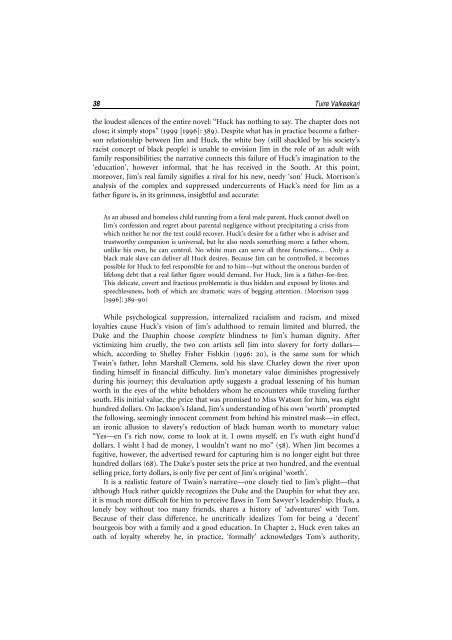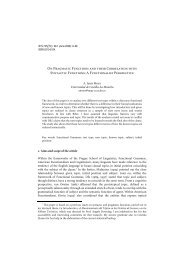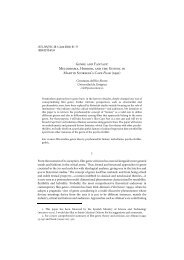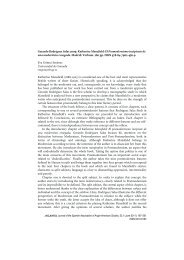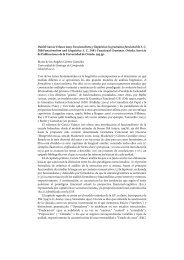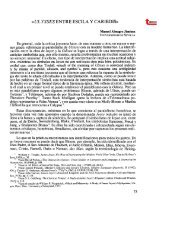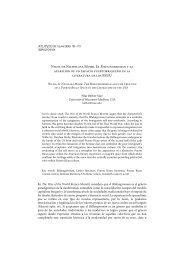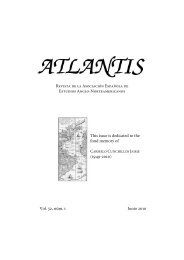Huck, Twain, and the Freedman's Shackles: Struggling with ... - Atlantis
Huck, Twain, and the Freedman's Shackles: Struggling with ... - Atlantis
Huck, Twain, and the Freedman's Shackles: Struggling with ... - Atlantis
You also want an ePaper? Increase the reach of your titles
YUMPU automatically turns print PDFs into web optimized ePapers that Google loves.
38 Tuire Valkeakari<br />
<strong>the</strong> loudest silences of <strong>the</strong> entire novel: “<strong>Huck</strong> has nothing to say. The chapter does not<br />
close; it simply stops” (1999 [1996]: 389). Despite what has in practice become a fa<strong>the</strong>rson<br />
relationship between Jim <strong>and</strong> <strong>Huck</strong>, <strong>the</strong> white boy (still shackled by his society’s<br />
racist concept of black people) is unable to envision Jim in <strong>the</strong> role of an adult <strong>with</strong><br />
family responsibilities; <strong>the</strong> narrative connects this failure of <strong>Huck</strong>’s imagination to <strong>the</strong><br />
‘education’, however informal, that he has received in <strong>the</strong> South. At this point,<br />
moreover, Jim’s real family signifies a rival for his new, needy ‘son’ <strong>Huck</strong>. Morrison’s<br />
analysis of <strong>the</strong> complex <strong>and</strong> suppressed undercurrents of <strong>Huck</strong>’s need for Jim as a<br />
fa<strong>the</strong>r figure is, in its grimness, insightful <strong>and</strong> accurate:<br />
As an abused <strong>and</strong> homeless child running from a feral male parent, <strong>Huck</strong> cannot dwell on<br />
Jim’s confession <strong>and</strong> regret about parental negligence <strong>with</strong>out precipitating a crisis from<br />
which nei<strong>the</strong>r he nor <strong>the</strong> text could recover. <strong>Huck</strong>’s desire for a fa<strong>the</strong>r who is adviser <strong>and</strong><br />
trustworthy companion is universal, but he also needs something more: a fa<strong>the</strong>r whom,<br />
unlike his own, he can control. No white man can serve all three functions.… Only a<br />
black male slave can deliver all <strong>Huck</strong> desires. Because Jim can be controlled, it becomes<br />
possible for <strong>Huck</strong> to feel responsible for <strong>and</strong> to him—but <strong>with</strong>out <strong>the</strong> onerous burden of<br />
lifelong debt that a real fa<strong>the</strong>r figure would dem<strong>and</strong>. For <strong>Huck</strong>, Jim is a fa<strong>the</strong>r-for-free.<br />
This delicate, covert <strong>and</strong> fractious problematic is thus hidden <strong>and</strong> exposed by litotes <strong>and</strong><br />
speechlessness, both of which are dramatic ways of begging attention. (Morrison 1999<br />
[1996]: 389–90)<br />
While psychological suppression, internalized racialism <strong>and</strong> racism, <strong>and</strong> mixed<br />
loyalties cause <strong>Huck</strong>’s vision of Jim’s adulthood to remain limited <strong>and</strong> blurred, <strong>the</strong><br />
Duke <strong>and</strong> <strong>the</strong> Dauphin choose complete blindness to Jim’s human dignity. After<br />
victimizing him cruelly, <strong>the</strong> two con artists sell Jim into slavery for forty dollars—<br />
which, according to Shelley Fisher Fishkin (1996: 20), is <strong>the</strong> same sum for which<br />
<strong>Twain</strong>’s fa<strong>the</strong>r, John Marshall Clemens, sold his slave Charley down <strong>the</strong> river upon<br />
finding himself in financial difficulty. Jim’s monetary value diminishes progressively<br />
during his journey; this devaluation aptly suggests a gradual lessening of his human<br />
worth in <strong>the</strong> eyes of <strong>the</strong> white beholders whom he encounters while traveling fur<strong>the</strong>r<br />
south. His initial value, <strong>the</strong> price that was promised to Miss Watson for him, was eight<br />
hundred dollars. On Jackson’s Isl<strong>and</strong>, Jim’s underst<strong>and</strong>ing of his own ‘worth’ prompted<br />
<strong>the</strong> following, seemingly innocent comment from behind his minstrel mask—in effect,<br />
an ironic allusion to slavery’s reduction of black human worth to monetary value:<br />
“Yes—en I’s rich now, come to look at it. I owns myself, en I’s wuth eight hund’d<br />
dollars. I wisht I had de money, I wouldn’t want no mo” (58). When Jim becomes a<br />
fugitive, however, <strong>the</strong> advertised reward for capturing him is no longer eight but three<br />
hundred dollars (68). The Duke’s poster sets <strong>the</strong> price at two hundred, <strong>and</strong> <strong>the</strong> eventual<br />
selling price, forty dollars, is only five per cent of Jim’s original ‘worth’.<br />
It is a realistic feature of <strong>Twain</strong>’s narrative—one closely tied to Jim’s plight—that<br />
although <strong>Huck</strong> ra<strong>the</strong>r quickly recognizes <strong>the</strong> Duke <strong>and</strong> <strong>the</strong> Dauphin for what <strong>the</strong>y are,<br />
it is much more difficult for him to perceive flaws in Tom Sawyer’s leadership. <strong>Huck</strong>, a<br />
lonely boy <strong>with</strong>out too many friends, shares a history of ‘adventures’ <strong>with</strong> Tom.<br />
Because of <strong>the</strong>ir class difference, he uncritically idealizes Tom for being a ‘decent’<br />
bourgeois boy <strong>with</strong> a family <strong>and</strong> a good education. In Chapter 2, <strong>Huck</strong> even takes an<br />
oath of loyalty whereby he, in practice, ‘formally’ acknowledges Tom’s authority,


